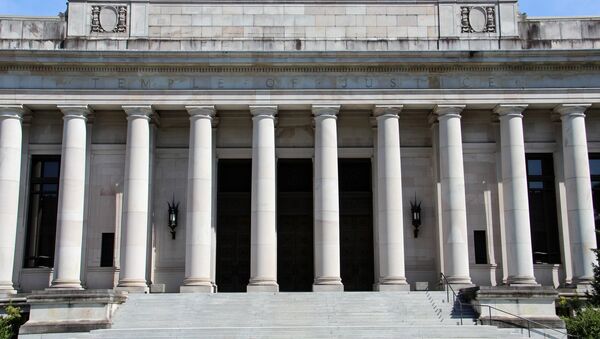WASHINGTON (Sputnik) — Voter sentiment looms large in the impending battle between President Barack Obama and the Republican-led Senate over a vacant Supreme Court seat, which promises to dominate the 2016 presidential campaign and possibly thrust the national debate over abortion into center stage, legal experts told Sputnik News on Wednesday.
Within hours of Justice Antonin Scalia’s unexpected death on Saturday, Obama vowed to quickly nominate a successor for the conservative jurist, and Senate leaders just as quickly vowed reject anyone the president chooses.
With the 2016 presidential campaign in full swing, the standoff makes the nation’s conservative-liberal divide perfect fodder for presidential candidate speeches and rallies leading to November’s vote on Obama’s successor.
Some lawmakers want the Senate to ignore Obama’s choice by refusing to hold hearings on the nomination for a Supreme Court justice. But political pressures generated by the presidential campaign could make the no-hearings option difficult, by thrusting the issue into close legislative races that will determine which party controls the Senate for the next two years.
The mood of the voters will decide whether Republicans block the nomination or allow a floor vote, Director of Clark University’s Law and Society Program Mark Miller told Sputnik.
"It all depends on whether President Obama wants to nominate a liberal to please his base, with no hope of confirmation, or a moderate who might have some chance of getting confirmed by the Senate," Miller explained.
Miller and more than two dozen legal experts flooded the journalist website ProfNet with Supreme Court comments on Wednesday as the nation awaited Obama’s selection.
"Justice Scalia's death will have a monumental impact on the court," said Associate Dean of American University’s School of Public Affairs Jessica Waters. "In the immediate future, several of the blockbuster cases before the court — including the most significant abortion case in decades, Whole Women's Health — now hang in the balance."
In March, the Supreme Court is scheduled to take up the case Whole Woman’s Health vs. Hellerstedt, in which abortion-rights activists are attempting to overturn a Texas law requiring doctors who perform abortions to have admitting privileges at local hospitals and also requiring clinics to meet building specifications of miniature hospitals known as ambulatory care centers.
The law would probably put about three-fourths of the 19 remaining abortion clinics in Texas out of business, the according to the Center for Reproductive Rights, which is representing the plaintiffs in the case.
"Abortion will now be the hot button for Senators like Charles Grassley, who chairs the Senate Judiciary Committee," James Robenalt, a partner at the Thompson Hine law firm told Sputnik.
As Senate Judiciary Committee chairman, Grassley gets to decide whether the Committee holds hearings and whether it is allowed to vote on a Supreme Court nominee. Without either, the full Senate would not be able to vote one way or the other.
Middle Tennessee State University Professor John Vile suggested, "Obama might find it to his advantage to nominate a sitting senator in hopes of getting confirmation."
"The interesting thing would be for Obama to nominate himself. It’s never been done before, but he does have a law degree," Vile told Sputnik.
Biola University Professor of Political Science Scott Waller said he expects Obama to inject racial and ethnic considerations into the debate by nominating someone it will be difficult to for the Senate to ignore.
"My guess is that it will be an African-American woman or someone else that represents a minority slice of the population. He will ask, ‘How can those mean Republicans deny the office to such a person?’" Waller suggested.
But, Waller added that any nominee Obama puts forth would swing the balance of the high court to the left because Scalia represented the court’s most conservative wing.

